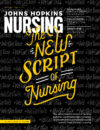Photo by Will KirkJacquelyn Campbell, PhD, RN, FAAN, and Sarah Szanton, PhD, ANP, FAAN—experts in the respective specialties of violence and aging—served as national advisers on a Centers for Medicare & Medicaid (CMS) committee examining the gap between clinical care and community services.
The team, which consisted of experts in housing, food security, interpersonal violence, transportation, education,employment, and other health-related social needs, met to provide recommendations on how to best implement a screening tool that can be used to better link CMS beneficiaries with social and community services. Campbell was selected for her expertise in preventing violence, and Szanton for her for work in aging, specifically around housing conditions and their impact on health and well-being.
The screening tool is one of the first steps in the new CMS Accountable Health Communities Model that is testing whether increased awareness of and access to health-related social services will decrease health care costs and/or improve quality of health. Over a five-year period, the CMS will look at outcomes among three groups—those who receive increased awareness of services, those who are offered navigation of services, and those who are actually aligned with services.
“This could lead to a much more inclusive definition of health,” says Szanton. “Historically, medical care has been about managing diseases and symptoms, but we also know that factors such as exposure to violence or having access to fresh foods impact health. If this model is a success, these screening questions could be used in other areas and lead to further interventions that address social determinants of health.”
Szanton, whose Community Aging in Place—Advancing Better Living for Elders (CAPABLE) program has focused on housing conditions among older adults, has seen the positive effects of modifying social factors. Preliminary findings of her research show that in addition to visits from a nurse and occupational therapists, minor modifications within the home like adding handrails or lowering cabinets dramatically decrease disability and improve self-care.
Campbell, who has studied intimate partner violence for more than 30 years, has also seen the impact of social factors in terms of exposure to violence. Offering the committee the knowledge and skills she learned by developing the Danger Assessment tool, which helps women determine the likelihood they will be killed by an intimate partner, she says exposure to violence and trauma are predictors of short- and long-term health.

